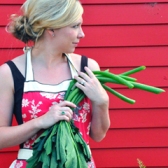Many of you probably read Haute Apple Pie, a blog attempting (and wildly succeeding) to redefine what it means to be a homemaker. I can’t get enough of these girls, which is apparent by my new Dash & Albert rugs at every door in my home, my success (finally!) in making edible sweet potato fries, and my newfound awareness of my decorating feng shui (pretty sure I’m wood and metal…).
Who knows, I may even pull off a birthday party as chic as this one for my future kid some day (calm down Ed… I am only kidding… we can stick to backyard BBQs, I promise).
I had a great question recently: Why has there been a decrease of vitamins and minerals in our fruits and vegetables? Why was an apple grown and picked in 1900 much, much healthier than the apples we find in our grocery stores today?
Non-organic fruits and veggies can be treated with things like pesticides, additives, antibiotics and nitrates. Pesticides are used to protect crops, and have been around for 4,500 years. In the 15th century, toxic chemicals such as mercury and lead were used to protect crops. Pesticides really took off in the 1940s when synthetic forms were introduced, and pesticide use has increased significantly since then.

These synthetic materials can be very harmful to us in large quantities, or even in small quantities over a long period of time. Sure, the EPA, FDA and USDA are all regulating pesticide use among farmers. But these pesticides are very toxic by nature (which is why they must be regulated) and although “safe” and acceptable limits have been defined, there is no consideration as to the dangers of these chemicals once they are ingested and thrown into our delicate cells. Our bodies were not made to tolerate pesticides.
In addition, the soil in which non-organic produce is grown is often treated to increase fertility of plants. These treatments can reduce nutrient density in plants, such as decreasing levels of vitamin C in tomatoes and increasing nitrates (harmful substances) in spinach.

Organic fruits and veggies have significantly higher levels of vitamins A, C and E; B vitamins; zinc; calcium; and other minerals. The organic soil fertility methods improve efficiency of nutrient uptake in plants, creating fruits and veggies packed with nutrients that promote plant health and therefore human health.
And let’s not forget about the importance of buying local. As soon as an apple is picked, it begins to lose nutrients. Most US produce is picked 4-7 days before it reaches the grocery store shelves; produce from other countries is even older by the time we get our hands on it.
The fresher the fruits and veggies are, the bolder the flavors. Not to mention the peace of mind associated with knowing what farm your produce came from, and the specific growing practices they use. Try to buy local whenever possible. Stickers on fruits and vegetables should tell you the country or state of origin, and the closer to your hometown the better. For some, buying local means stepping outside and picking a few things from their own backyard. For others, it’s the neighborhood farmer’s market.

To sum it up, local and organic fruits and vegetables contain higher levels of nutrients, giving our bodies more power and health and reducing the amount of toxins we ingest. They may cost a bit more, but we are also getting more bang for our buck. Since most of us are on a budget, the Dirty Dozen and Clean 15 lists can help when choosing which items to buy organic. Just make sure to get a good produce brush to properly clean fruits and vegetables before you eat them.

Thanks to the lovely ladies at HAP blog for helping to make our homes (and our health!) more haute, one day at a time!











Ann, you are so great! Thanks for this wonderful shout out.
ReplyDeleteAnd since we're on the topic of buying local, we also did a post about farmers markets and how to find them. Sadly in WI they've closed up shop for the year but they'll be back soon enough!
Here's the post:
http://hauteapplepie.wordpress.com/2009/09/21/hunters-gatherers
Thanks Katie! This is helpful. I love your post on Hunters and Gatherers! My husband is also a hunter so I guess that makes me the gatherer...
ReplyDelete